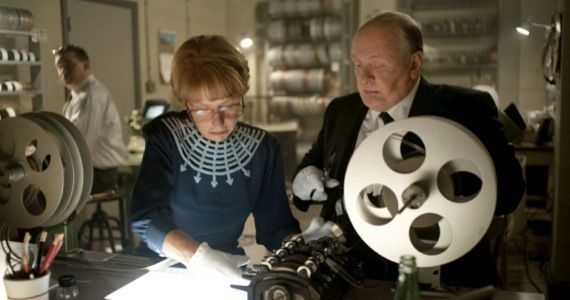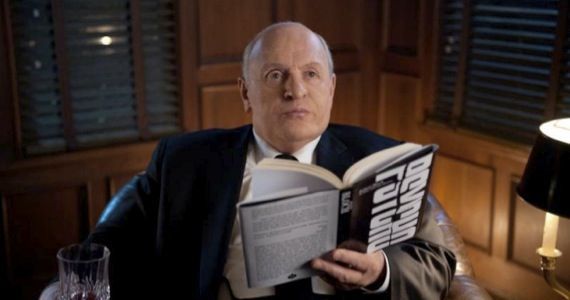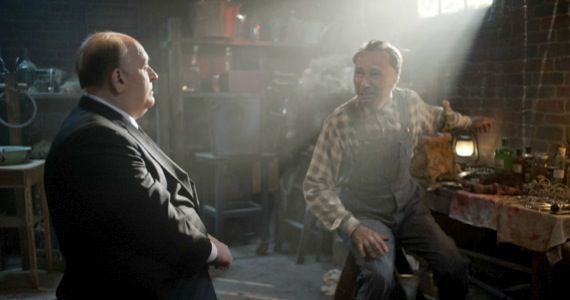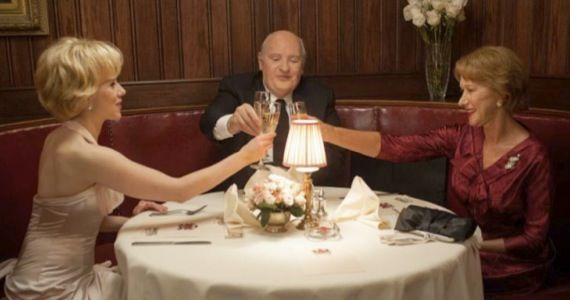The film should be entertaining for die-hard Hitchcock fans, as well as moviegoers who are casually familiar with his cinema.
Cinema history has immortalized Alfred Hitchcock as one of the greatest directors of the 20th Century, so it's easy to forget that things weren't quite so rosy for the 'Master of Suspense' back in 1959. Hitch may have been back on top of the world thanks to the success of North by Northwest, but (to quote Shakespeare) uneasy lies the head that wears a crown - as concerns about old age and doubts after his previous picture Vertigo (which was a critical and financial flop upon initial release, believe it or not) weighed heavily on his mind.
Hitchcock picks up on the evening of North by Northwest's red carpet premiere, telling the story of how 60-year old Hitch (Anthony Hopkins) stepped outside his 'comfort zone' by adapting author Robert Bloch's then little-known novel Psycho. Director Sacha Gervasi's biopic also examines the relationship between Hitch and his loyal wife/collaborator Alma Reville (Helen Mirren) in the context of their time making a movie based on Bloch's book - which would go on to be regarded as a suspense/horror masterpiece
Hitchcock stands apart from your average memoir about a Hollywood icon (ex. My Week With Marilyn) with regard to how it imitates the mise-en-scène of Hitch's Technicolor pictures. Moreover, Gervasi's biopic is book-ended by amusing scenes where Hopkins recreates Hitch's cheeky opening and closing remarks as the host on the Alfred Hitchcock Presents TV show. While that helps to elevate the movie to become a clever and respectful salute to its subject's craft, Hitchcock never quite manages to rise above feeling like a kitschy love letter.
That's in part because such elements as the direction from Gervasi and Bernard Herrmann-esque score composed by Danny Elfman work as a spirited imitation of their inspiration; unfortunately, other elements like the cluttered script from John J. McLaughlin (Black Swan) - more on that in a moment - and somewhat uneven cinematography from Oscar-nominee Jeff Cronenweth (The Social Network) are less impressive. Nonetheless, Hitchcock as a whole boasts enough style to work as a fun homage - especially for cinephiles and (for lack of a better term) film nerds who'll catch all the references and Easter Eggs.
McLaughlin's screenplay unfolds as a by-the-numbers (but still generally engaging) memoir during its first and third act, highlighting the more interesting anecdotes from the real-life story about Hitch and Alma's struggle to make Psycho. However, the second act shifts its focus to a subplot where Alma collaborates with a two-bit writer named Whitfield Cook (Danny Huston), who may not have noble intentions. This segment is cleverly designed to unfold as a 'realistic' version of a Hitchcockian tale of suspense, but it also contributes to the over-arching narrative feeling a bit episodic.
Similarly, the dream/hallucination sequences where Hitch interacts with Ed Gein (Michael Wincott) - the loose-inspiration for Psycho's Norman Bates - do recall the type of symbolism-laced psychological drama often present in the filmmaker's art. Some mirror Hitch's state of mind at any given moment in the story, while others illustrate how he could've been able to empathize with (perhaps even understand) Gein/Bates. Unfortunately, these scenes in general do not offer any more insight into the inner-workings of the director beyond what's already been made apparent on the surface (or addressed through dialogue).
Hence, there are times where Hitchcock unfolds in a clunky manner, as a result of the focus meandering too far in different directions (one being the story about the making of Psycho, the other being about Hitch and his marriage). These threads end up tying together at times, but usually in either a heavy-handed fashion - like when Hitch acts out his inner-rage while shooting Psycho's famous shower scene - or a manner that doesn't have much significance. Thus, Hitchcock ends up falling somewhere between a satisfying memoir and touching love story - but fails to be both, contrary to its aspirations.
Not surprisingly, the performances from Hopkins and Mirren are strong enough to carry Hitchcock on through the rough patches. The role of Hitch plays to Hopkins' strengths; as such, the Oscar-winner captures the director's well-documented droll wit, while also expressing a number of complex emotions and digging deep enough to bring out the flawed human side of the legend (even as he acts beneath a layer of seamless, if not always natural in appearance, makeup). Mirren likewise brings a fiery spunk and spirit to Alma; the scenes between she and Hopkins are also the film's best (be they casual, funny, or intense in tone).
The supporting cast is likewise quite solid. Scarlett Johansson and Jessica Biel play two very different Hitchcock muses (Psycho starlet Janet Leigh and almost-Vertigo headliner Vera Miles); each actress handles their character's simple, but clean, arc well enough. Meanwhile, Huston (Magic City) as Cook, Toni Collette (United States of Tara) as Hitch's secretary Peggy Robertson and Michael Stuhlbarg (Boardwalk Empire) as the director's agent, Lew Wasserman, make good use of their limited screen time.
The only performances that feel off and out of place are those from Ralph Macchio (The Karate Kid) - as Psycho screenwriter Joe Stefano - and James D'Arcy (Cloud Atlas) as Anthony Perkins. To be fair, though, that's mostly because the pair are just onscreen for too short a time to come off as much more than a collection of tics (rather than genuine, if somewhat odd, people).
So, overall, Hitchcock gets points for being more ambitious than your average tried-and-true Hollywood memoir - even if it's only moderately successful in that task, despite Hopkins and Mirren's best efforts. Their performances are indeed the sort of Oscar bait that could gain recognition during awards season; that they also succeed in making Hitchcock worth checking out is more important, though.
On that note: the film should be entertaining for die-hard Hitchcock fans, as well as moviegoers who are casually familiar with his cinema. However, complete novices to Hitch's art should not begin here - as it assumes that the audience is familiar with both Psycho's significance and the director's greater place in cinema history.
Here is the official trailer for Hitchcock:
-
Hitchcock is now in limited release around the U.S., but will expand to more theaters over the forthcoming weeks. It is Rated PG-13 for some violent images, sexual content and thematic material.




